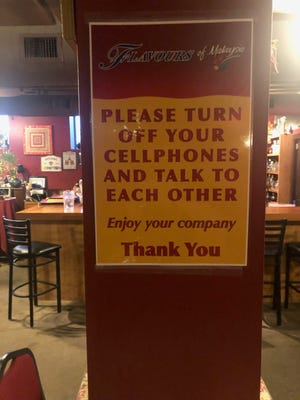LATEST FINANCIAL NEWS
Why quitting tech and social media is harder than quitting cigarettes
Trying to break free of the constant lure of your smartphone could make you feel like Michael Corleone in “The Godfather Part III”: “Just when I thought I was out, they pull me back in.”
Bill Johnson tried taking a break. The 46-year-old sales director from Marion, Iowa, stopped using social media for 30 days, and it was eye-opening: Johnson read books, tackled his to-do list and discovered a knack for cooking.
But then he slowly re-introduced social media in his life, “and guess what? I started spending too much time on it again.”
Johnson’s giving social media abstinence another shot – this time for 90 days.
Aditya Rao has also found it hard to kick the habit: “I gave up completely on smartphones, and the experience for me was tougher than quitting cigarettes.”
Is it possible to unplug from the Matrix? And really, would you even want to?
Machines instead of humans
The smartphone most of us are fixated on is the most obvious affront to an age when folks looked each other in the eye rather than at some screen. But it’s not alone.
Consider how often you interact with or seek customer service from a robot or machine, as opposed to a human. And it may get worse through the expansion of artificial intelligence, machine learning, and eventually next-generation 5G wireless networks.
Disturbing signposts have been apparent for a few years, like when your bank charges a fee because you have the audacity to engage with a human teller rather than the ATM.
Still, many of us, whether willingly or reluctantly, are all in on digital – to bank, invest, shop, make travel plans, get directions, get answers, get news, play games, consume entertainment, check grades and homework, and, yes, connect and socialize. It may only be a small exaggeration to suggest that you talk to Alexa, Google or Siri more often than you do your life partner.
The potential dark side of digital
Technology facilitates progress and convenience, sure.
But there’s a potentially darker side to our all-too-frequent digital-only interactions: loss of privacy, loss of dignity, less frequent face-to-face human contact, more data breaches and security threats.
A recent Identity Threat Assessment and Prediction report from the University of Texas at Austin showed that of all the consequences experienced by victims of breaches –including financial loss, property loss and reputation damage – a whopping 80% of victims reported emotional distress.
Meanwhile, many young people especially have been drowning in the distress caused by social media.
“There is huge concern these days about the potential impact of social media and 24/7 tech use on today’s teens, including linking social media use to technology addiction, the decay of in-person social skills, and multiple harms to kids’ mental well-being,” says James Steyer, CEO of Common Sense Media, a non-profit advocacy group for kids and families.
Jake Sahadi, now 26, got hooked on social media at 13, first through MySpace and in later years, Facebook, Twitter and Instagram. “This really did halt my life in terms of reaching my full potential,” he says. “I suffered from bad grades all throughout high school and didn’t make it that far in college. I had no sense of prioritizing since all I wanted to do was be online.”
Sahadi, who lives in the metro Detroit area, recently cut back his social media to no more than five minutes per day and, with his newfound time, has taken on leather crafting and hiking and will also be returning to college this fall.
Still, a complete societal disconnect from tech doesn’t seem plausible.
“Few serious commentators think we’d be better off retreating to an earlier technological age. But at the same time, people are tired of feeling like they’ve become a slave to their devices,” writes Georgetown computer science professor Cal Newport in “Digital Minimalism: Choosing a Focused Life in a Noisy World.”
Newport’s book helped motivate Sahadi, Johnson, Rao and numerous others attempt to dial back their smartphone and social media usage. Among his recommendations is to start from scratch and remove from your devices all the apps “from companies that make money from your attention.”
Determine which ones are important and why, he says, and then dispose of the stuff that doesn’t really matter.
“It’s essentially cleaning out your closet, except it’s your phone.”
Even if you’re not ready to give up Facebook say full-time – you may have sound reasons to periodically visit a community group, for example – Newport urges people to remove the app from your phone and only check the social network from a computer browser. That little bit of added friction can make a big difference.
Spark joy:Use Marie Kondo-inspired method to declutter your smartphone
Tim Kendall, the CEO of Moment, an app that aims to coach people into reducing smartphone usage, says it’s not so much about cutting off technology altogether as it is “to be deliberate and thoughtful about your three wishes.”
Kendall points to studies that show that excessive use of social media can cause depression. It’s like junk food. Having a single cookie isn’t bad, he says. Having 20 is.
Cutting back phone usage
While 60% of smartphone owners responding to an online USA TODAY/SurveyMonkey poll, indicated that it wouldn’t be hard to give up their phones for a single day, few were willing to be untethered for much longer than that. Two-thirds said that it would be hard to give up their smartphones for a week; 79% said it would be hard for a month or longer.
No wonder. Nearly 8 in 10 respondents say they rely on phones for everyday tasks, from texting and email to checking the weather and traffic.
Still, just under half of the respondents (47%) intentionally tried to cut back on the amount they use their smartphones; 82% of those who did said they were very or somewhat successful.
Thirty-nine percent tried to cut back “cold turkey”; another 39% curtailed their usage by deleting, signing out of or moving apps to make them harder to access.
A mere 2% of respondents attended a formal digital detox program.
Only 43% said that cutting back improved their mental state, while half said it had no effect on them.
Devotees of Newport’s approach view it differently.
Grant Gurewitz who now works in communications at the Seattle-Tacoma airport says a little over a year ago, “I realized my devices were ruling my life, and it was impacting me both mentally and physically. I was not present for my wife. I reached a lull professionally. I wasn’t making time for my other relationships since I was always consumed in my devices. And I was tired and feeling burnt out.”
Since then, Gurewitz changed jobs, removed social media apps from his phone, turned off push notifications, stopped using his phone each night by 8:30 or 9, and stopped looking at the device within the first hour in which he wakes up. He also began blogging about “how to build a forcefield around your attention and only let in the most important stuff, so you can think for yourself.”
Sticking with a ‘dumb phone’
For some, it’s fine to forgo some of the technologies touted as smart.
Ze’ev Smason, a congregational rabbi in St. Louis and another reader of Newport’s book, says that “as a throwback to the Stone Age, I am the proud owner of a ‘dumb phone.’ I have succeeded in resisting subtle and not-so-subtle attempts from family, friends and fellow professionals to come to my senses and enter the 21st century by using a smartphone.”
The pros outweigh the cons for Smason.
“Avoidance of distractions associated with perpetual connectivity and availability allows me to create in several important areas of life a higher quality and greater depth; specifically, in interpersonal relationships, and in my writing, speaking, teaching and thinking.”
But Smason also concedes that if he traveled more frequently, “I might consider having a smartphone just for the Uber app,” which he describes as “absolutely awesome!”
Remember flip phones? These cellphones and smartphones no longer exist
Jason Fertig, an associate professor of management at the University of Southern Indiana, asks students to abstain for 24 hours to a week from any non-essential, non-work-related technology, and then blog about the experiences in class.
“Pretty much all report back a feeling of `getting more things done,’ `being more connected to family,’ and `it was harder at first than I thought/didn’t realize how much time I spent,’” Fertig says.

Few of us, though, are ready to become full-time digital hermits or could cope for very long in a remote town such as Green Bank, West Virginia, which because it is smack in the middle of the Federally-designated National Quiet Zone, famously bans the use of cellphones, Wi-Fi and other wireless tech.
Green Bank’s objective isn’t about a digital decompress, though. It’s to minimize interference with the Green Bank Observatory, home to the world’s largest steerable telescope, where, as the website puts it, “radio astronomers are listening to the remote whispers of the universe.” (Yep, they’re searching for aliens.)
Won’t you forget about me:This is where robocalls are coming from (and where they are targeting)
Taking a cruise could be a foreign experience for some, with cellphone service virtually non-existent on the open sea. Still, whenever the ship approaches a port with internet, you can see people scrambling to pull out their phones like addicts finally getting their fix.
Device-free spaces give permission to cut ties to technology, even for just a few hours. Flavours Restaurant in Pittsfield, Massachusetts, for instance, displays a sign that implores patrons to “Please turn off your cellphones and talk to each other.”

Last year, certain Wyndham Grand Hotels offered families a 5% discount under a “Reconnected” program that encouraged parents and children to put their devices away and enjoy creative in-room activities instead.
Echoing past fears
And yet not every incidence of phone use is at is seems. It may not always be that soul-sucking disconnect many warn about.
Jenny Odell, who teaches art at Stanford and authored “How To Do Nothing: Resisting the Attention Economy,” says the cliché is that everyone looks at their phone and doesn’t talk to each other or pays attention to their surroundings.
But then she gives the example of the iNaturalist app, in which people within a social community can help others identify the animals and plants they photograph.
“If you saw someone on a hike with their phone out, you might make all these assumptions about ‘Oh, they’re not enjoying themselves,’” Odell says. “But what if they’re using the phone to actually learn more about the plants around them? It’s not only an issue of balance but also what you’re using it for.” In fact, the iNaturalist community holds Happy Hour meet-ups
The fears around digital abundance echo some of the concerns of the past.
University of Michigan School of Information associate professor Sarita Schoenebeck says that before social media, people panicked about violence in video games, about TV rotting our brains, about radio, even about the early days of the written word.
“Every new technology, there’s been societal pushback saying it’s going to tarnish our ability to communicate or to think. Sometimes it’s a little bit reassuring to remember that this is how we’ve always reacted.”









